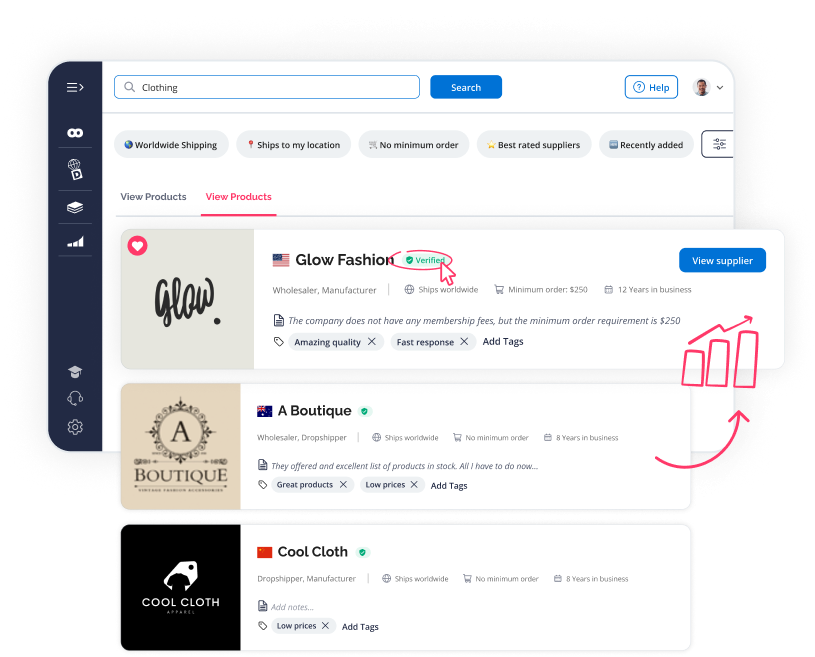Wholesale Stationery Suppliers for Ecommerce Sellers
When sourcing stationery products, you're tapping into a vibrant market filled with endless creativity and utility, from beautifully designed notebooks to eco-friendly pens. High-quality stationery not only enhances productivity but also adds a touch of personalization to everyday tasks. When choosing suppliers, prioritize those who offer a blend of style, durability, and sustainable materials, and don't hesitate to request samples to ensure their products align with your brand's vision and values

Here’s a selection of suppliers waiting for your call
Wholesale Supplier
 Verified
Verified
 Join to contact this supplier
Join to contact this supplier
 No Minimum Order
No Minimum Order
 15 Years in SaleHoo
15 Years in SaleHoo
Products stocked
About
Wholesale Supplier
 Verified
Verified
 Join to contact this supplier
Join to contact this supplier
 No Minimum Order
No Minimum Order
 24 Years in SaleHoo
24 Years in SaleHoo
Products stocked
About
Manufacturer Supplier
 Verified
Verified
 Join to contact this supplier
Join to contact this supplier
 No Minimum Order
No Minimum Order
 22 Years in SaleHoo
22 Years in SaleHoo
Products stocked
About
Manufacturer Supplier
 Verified
Verified
 Join to contact this supplier
Join to contact this supplier
 No Minimum Order
No Minimum Order
 1 Years in SaleHoo
1 Years in SaleHoo
Products stocked
About
Wholesale Supplier
 Verified
Verified
 Join to contact this supplier
Join to contact this supplier
 No Minimum Order
No Minimum Order
 8 Years in SaleHoo
8 Years in SaleHoo
Products stocked
About
Manufacturer Supplier
 Verified
Verified
 Join to contact this supplier
Join to contact this supplier
 No Minimum Order
No Minimum Order
 1 Years in SaleHoo
1 Years in SaleHoo
Products stocked
About
Wholesale Supplier
 Verified
Verified
 Join to contact this supplier
Join to contact this supplier
 No Minimum Order
No Minimum Order
 21 Years in SaleHoo
21 Years in SaleHoo
Products stocked
About
Wholesale Supplier
 Verified
Verified
 Join to contact this supplier
Join to contact this supplier
 No Minimum Order
No Minimum Order
 18 Years in SaleHoo
18 Years in SaleHoo
Products stocked
About
Wholesale Supplier
 Verified
Verified
 Join to contact this supplier
Join to contact this supplier
 No Minimum Order
No Minimum Order
 22 Years in SaleHoo
22 Years in SaleHoo
Products stocked
About
Wholesale Supplier
 Verified
Verified
 Join to contact this supplier
Join to contact this supplier
 No Minimum Order
No Minimum Order
 1 Years in SaleHoo
1 Years in SaleHoo
Products stocked
About
Other product suppliers available...
Trusted by 137,000+ entrepreneurs worldwide

7-day trial today
suppliers in the USA and internationally.
Frequently Asked Questions
Common materials for stationery include wood pulp for paper, plastics for binders, and metal for clips. The quality of these materials can impact the durability, printability, and overall aesthetic of the final product.
Minimum order quantities can vary widely among suppliers, typically ranging from 100 to 1,000 units. It's important to discuss MOQs upfront to ensure they align with your business needs and budget.
Inquire about certifications such as FSC (Forest Stewardship Council) for paper products and request documentation or reports that demonstrate eco-friendly practices. Suppliers committed to sustainability will readily provide this information.
Lead times can range from 2-4 weeks for production, depending on the complexity of the design and the supplier's capacity. Shipping time will also need to be factored in, which can vary based on the method and destination.
Implementing a robust quality control procedure is vital, which may include pre-production samples, in-process inspections, and final product audits. It's also beneficial to establish clear quality standards and communicate these with your supplier.


